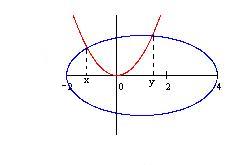Fixed-Point Iteration Method
Let
f1(x, y, . . . , z) = 0
f2(x, y, . . ., z) = 0
. . .
. . .
. . .
fn(x, y, . . ., z) = 0
are n
Transcendental equations in n independent
variables x, y, . . ., z. Then by starting
with some initial approximation (x0, y0,
. . ., z0) generating a sequence
{(xi, yi, . . ., zi)}
using
xi+1 = g1(xi, yi
, . . . ,zi) from the first equation
yi+1 = g2(xi, yi
, . . . ,zi) from the second
equation
. . .
. . .
. . .
zi+1 = gn(xi, yi
, . . . ,zi) from the last equation
which converges to (s,
t , . . ., u) is called the fixed point iteration
to solve system of non-linear equations.
Condition for Convergence :
The above fixed point iteration
scheme converges only if
| | |
¶g
i |
| |
|
| |
¶g
i |
|
|
|
| |
¶g
i |
| |
|
+ |
|
+ . . .
+ |
|
| ¶x |
|
¶y |
|
¶z |
at (s, t, . .
., u) must be less than one for all i
= 1, 2, . . ., n.
Example:

Solve for
x and y if x
2 - y = 0 and
8x - 4x2 +32 - 9y2 = 0
.
Let
xi+1 = g1(xi,
yi) = (2xi + x2i - y)/2
yi+1 = g2(x
i, yi) = (2xi - x2i
+ 8)/9 + (4yi - y2i)/4
Let the initial approximation is (-1, 1)
|
i
|
0
|
1
|
2
|
3
|
4
|
5
|
6
|
7
|
8
|
9
|
10
|
|
xi
|
-1
|
-1
|
-1.153
|
-1.153
|
-1.206
|
-1.181
|
-1.169
|
-1.172
|
-1.175
|
-1.174
|
-1.174
|
|
yi
|
1
|
1.306
|
1.435
|
1.435
|
1.405
|
1.371
|
1.373
|
1.379
|
1.379
|
1.375
|
1.375
|
|